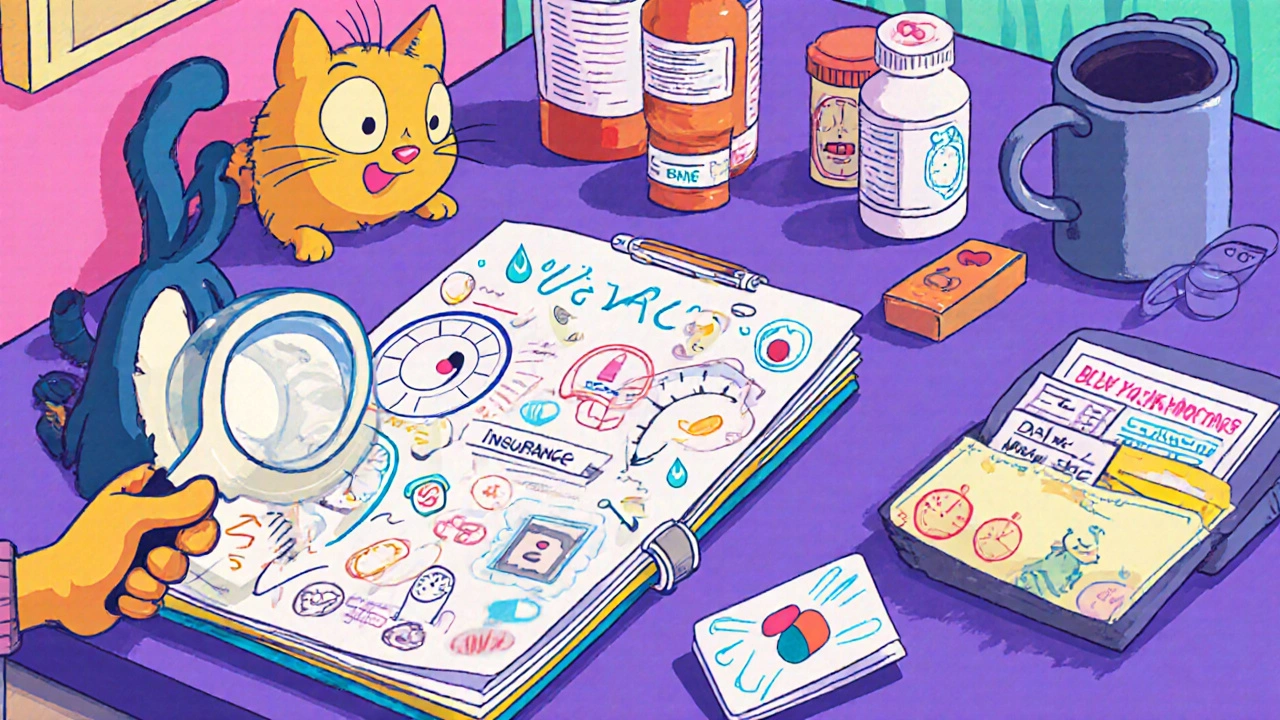Darifenacin Dosing Assistant
Personalized Dosing Guidance
This tool helps you understand appropriate darifenacin dosage based on your health profile. Always discuss with your doctor before making changes to your medication.
Feeling uneasy about bringing up a prescription can make any doctor visit feel like a test. When the medication in question is darifenacin, a drug used to calm an overactive bladder, you’ll want to walk into the consultation armed with the right facts and the right questions. This guide walks you through exactly what to know, what to ask, and how to keep the conversation productive.
What Is Darifenacin?
Darifenacin is a selective antimuscarinic medication marketed under the brand name Enablex, approved by the FDA in 2004 for the treatment of overactive bladder symptoms such as urgency, frequency, and urge incontinence. It works by blocking the muscarinic receptors in the bladder muscle, reducing involuntary contractions. Typical dosing starts at 7.5mg once daily, with a possible increase to 15mg if tolerated.
Why Discuss Darifenacin With Your Doctor?
Even though darifenacin is prescribed for a specific set of symptoms, every patient’s health profile is unique. Talking openly helps you and your doctor decide whether the drug fits your situation, how to manage side effects, and when to consider alternatives.
Common reasons patients raise the topic include:
- Unclear whether symptoms justify medication.
- Worried about side effects like dry mouth or constipation.
- Need to understand how the drug interacts with other medicines.
- Concerns about cost, insurance coverage, or generic options.
- Desire to know the plan for follow‑up and monitoring.
Preparing for the Appointment
Show up with a concise snapshot of your health. The more organized you are, the smoother the conversation.
- Symptom Diary: Track bladder episodes for a week - note time, urgency level, any leakage, and fluid intake.
- Medication List: Write down every prescription, over‑the‑counter drug, and supplement you take. Include dosage and frequency.
- Medical History Highlights: Note any conditions that could affect drug choice - glaucoma, urinary retention, severe liver disease, or heart problems.
- Insurance Details: Have your policy number ready and check whether darifenacin is on the formulary.
Bringing these notes turns a vague complaint into a clear data set that your Healthcare Provider can quickly assess.
Key Questions to Ask Your Doctor
When you sit down, prioritize the most important concerns. Here are ten questions you can adapt:
- What specific bladder symptoms does darifenacin target, and how soon might I notice improvement?
- Are there particular health conditions that make darifenacin unsafe for me?
- How does darifenacin compare to other antimuscarinic options, such as oxybutynin or tolterodine?
- What side effects should I monitor, and how can I mitigate them?
- Do I need any lab tests (liver function, kidney function) before starting?
- Can I take darifenacin with my current medications, especially Drug Interaction risks like digoxin, antifungals, or certain antidepressants?
- Is there a generic version, and will it affect cost or efficacy?
- How should I schedule follow‑up appointments to assess response?
- What should I do if I miss a dose?
- Are lifestyle changes (fluid timing, pelvic floor exercises) recommended alongside the drug?

Understanding Side Effects and Safety
Darifenacin’s most common side effects are dry mouth, constipation, and blurred vision. They stem from its antimuscarinic action, which can also affect other smooth muscles.
If you experience any of the following, call your doctor promptly:
- Severe constipation that doesn’t improve with diet changes.
- Difficulty urinating or a feeling that the bladder isn’t emptying.
- Sudden vision changes or eye pain (possible angle‑closure glaucoma warning).
- Rapid heartbeat, dizziness, or fainting.
Because the drug is processed mainly by the liver, patients with hepatic impairment may need dose adjustments. Your doctor might order baseline liver function tests and repeat them after a month of therapy.
Dosage and Administration Tips
Typical dosing starts at 7.5mg taken once daily with or without food. If tolerated, the dose can be increased to 15mg. Here’s a quick cheat‑sheet:
| Starting Dose | Usual Maintenance | How to Take | Missed Dose |
|---|---|---|---|
| 7.5mg | 15mg (if needed) | Swallow whole tablet with water. Food not required. | Take as soon as remembered unless it’s almost time for the next dose. Do not double up. |
Some clinicians suggest taking the dose at night to reduce the impact of dry mouth on daily activities.
Comparing Darifenacin With Other Antimuscarinics
| Medication | Brand Name | Typical Daily Dose | Common Side Effects |
|---|---|---|---|
| Darifenacin | Enablex | 7.5mg - 15mg | Dry mouth, constipation, blurred vision |
| Oxybutynin | Ditropan | 5mg twice daily (or extended‑release 10mg daily) | Dry mouth, constipation, dizziness, tachycardia |
| Tolterodine | Detrol | 2mg twice daily (or extended‑release 4mg daily) | Dry mouth, headache, nausea |
Darifenacin is often praised for a lower incidence of constipation compared with oxybutynin, but it may cause more blurred vision. Choose the one that aligns best with your health profile and lifestyle.
Talking Money: Insurance, Generics, and Cost‑Saving Strategies
In the UK, darifenacin is available on the NHS under its generic name, but private prescriptions can be pricey. Ask your doctor:
- Is the generic version appropriate for me?
- Does my prescription pre‑authorisation need a specialist’s note?
- Are there patient assistance programs from the manufacturer?
- Would a 90‑day supply reduce per‑tablet cost?
Knowing the exact cost beforehand prevents surprise bills and helps you decide whether to stick with darifenacin or explore a cheaper alternative.
Follow‑Up and Monitoring Plan
Effective treatment isn’t a one‑off event. Set a clear schedule:
- First follow‑up (2-4 weeks) to assess symptom relief and side effects.
- Lab check (liver enzymes) at month 1 if you have any liver concerns.
- Quarterly visits thereafter to fine‑tune dosage or discuss switching if needed.
Keep updating your symptom diary and bring it to each visit - it’s the best evidence of how well the medication is working.
Frequently Asked Questions
Can I take darifenacin if I have glaucoma?
Closed‑angle glaucoma is a contraindication because antimuscarinics can increase intra‑ocular pressure. If you have any form of glaucoma, discuss alternative therapies with your doctor.
What should I do if I miss a dose?
Take the missed tablet as soon as you remember unless it’s almost time for the next scheduled dose. In that case, skip the missed one and continue with your regular timing - never double up.
Is there a risk of severe constipation?
Constipation is a common side effect, but severe cases are rare. Increase fiber intake, stay hydrated, and consider a mild stool softener if needed. If you can’t have a bowel movement for more than three days, call your doctor.
Do I need to stop other medications before starting darifenacin?
Most medicines are safe to continue, but darifenacin can interact with drugs that also affect the heart rhythm (like certain anti‑arrhythmics) or those metabolised by CYP3A4 enzymes (e.g., ketoconazole). Your doctor will review your full medication list.
How long does it take to feel better?
Most patients notice a reduction in urgency and frequency within 1-2 weeks, but full benefit may take up to 4 weeks. Keep the diary to track progress.








Patrick Hendrick October 15, 2025
Great checklist!!! Keep that symptom diary, bring a meds list, and ask about liver tests!!!
abhishek agarwal October 18, 2025
Listen, you’ve got to demand clarity on drug interactions-no one should leave the office guessing whether your heart meds mess with darifenacin, so ask straight up and push for a written plan.
Michael J Ryan October 21, 2025
I love how the guide breaks down the prep steps; just a quick heads‑up-make sure your diary notes the exact fluid ounces you drink, it helps the doc pinpoint patterns without extra guesswork.
Khalil BB October 25, 2025
We chase relief yet forget the body’s quiet signals; ask if your bladder’s whispering a deeper issue before silencing it with pills.
Keri Shrable October 28, 2025
This is super helpful and brightens the whole process its like having a friendly map through a maze of meds
Destiny Hixon October 31, 2025
Honestly dont waste time with generic fluff just ask the doc if the brand is worth the price and its not some cheap fake
mike brown November 3, 2025
Well, if everyone’s raving about darifenacin, maybe we should question if it’s really the only answer-sometimes the hype overshadows simpler lifestyle tweaks.
shawn micheal November 6, 2025
I hear you, and it’s normal to feel nervous; just remember the doc is there to partner with you-share those diary details, breathe, and let the conversation flow naturally.
Stephen Jahl November 9, 2025
Darifenacin, a highly selective M3 muscarinic antagonist, operates via a mechanistic inhibition of detrusor muscle overactivity, thereby attenuating involuntary contractions.
Its pharmacokinetic profile is characterized by a hepatic first-pass effect mediated predominantly by CYP3A4 isoenzymes, necessitating vigilance in polypharmacy contexts.
Consequently, clinicians must conduct a comprehensive medication reconciliation to preempt adverse modulatory interactions, particularly with agents such as ketoconazole or erythromycin.
Baseline hepatic function assays, encompassing ALT and AST quantification, should be obtained prior to initiation, given the drug's extensive hepatic metabolism.
Renal excretion is minimal; however, in patients with concomitant renal insufficiency, dose adjustments are generally unwarranted but should be corroborated with clinical judgement.
The anticholinergic burden of darifenacin manifests principally as xerostomia, gastrointestinal hypomotility, and occasional accommodative ocular disturbances.
Mitigation strategies include recommending sialogogues, augmenting dietary fiber, and scheduling dosing in the evening to exploit circadian salivation patterns.
Therapeutic efficacy typically becomes appreciable within one to two weeks, yet the maximal clinical response may be observed at the four‑week horizon.
Scheduled follow‑up at the two‑week interval permits early detection of suboptimal response or emergent side effects, facilitating timely titration.
Should intolerable adverse events arise, a stepwise de‑escalation protocol is advisable before complete discontinuation, thereby preserving therapeutic options.
From a pharmacoeconomic standpoint, the availability of a generic formulation warrants inquiry into formulary placement, co‑pay liabilities, and potential patient assistance programs.
Patients with a history of closed‑angle glaucoma are contraindicated due to the drug’s propensity to increase intra‑ocular pressure, mandating alternative therapeutic pathways.
Engagement in bladder training exercises and fluid management adjuncts synergistically enhances outcomes when combined with pharmacotherapy.
Documentation of symptom metrics via validated instruments such as the Overactive Bladder Symptom Score (OAB‑SS) augments objective assessment during longitudinal care.
In sum, a methodical, data‑driven dialogue with the prescribing clinician optimizes both safety and efficacy parameters of darifenacin therapy.
gershwin mkhatshwa November 13, 2025
Nice rundown-just remember to bring that diary, stay chill, and let the doc know what’s working and what’s not; the more relaxed you are, the smoother the visit.
Louis Robert November 16, 2025
Quick tip: ask the physician to write down the follow‑up schedule so you don’t have to rely on memory.
tim jeurissen November 19, 2025
Note that “diary” is correctly spelled, and “medication” should not be abbreviated; also, “its” requires an apostrophe when denoting possession (“its effects”).
lorna Rickwood November 22, 2025
Life is a series of choices a drug is just one of them and sometimes the quiet voice inside knows best